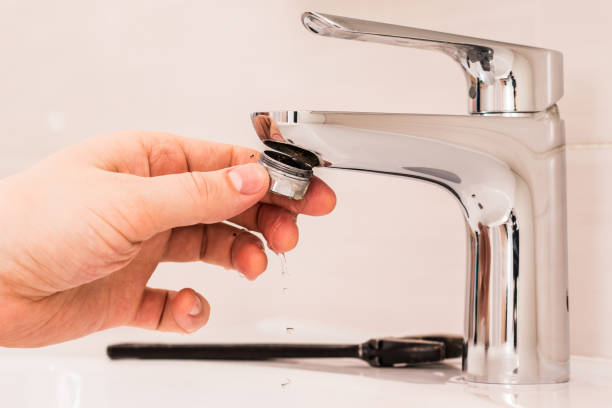Learning the Importance of Repairing a Faulty Faucet
Learning the Importance of Repairing a Faulty Faucet
Blog Article
They are making a few good points relating to Should I Repair or Replace a Leaky Faucet? in general in this article on the next paragraphs.

Dripping taps may seem like a minor inconvenience, yet their influence goes beyond simply the annoyance of the sound. From wasting water to sustaining unneeded monetary expenses and health dangers, disregarding a leaking faucet can result in numerous effects. In this post, we'll delve into why it's important to address this typical household concern without delay and efficiently.
Waste of Water
Ecological Impact
Leaking faucets contribute significantly to water wastage. According to the Epa (EPA), a single faucet leaking at one drip per second can squander more than 3,000 gallons of water annually. This not only stress water resources yet likewise affects ecological communities and wild animals based on them.
Financial Prices
Raised Water Costs
Past the environmental influence, dripping taps can pump up water costs considerably. The collected wastefulness over time translates right into higher energy expenses, which can have been stayed clear of with timely repair services.
Prospective Home Damages
Additionally, long term dripping can result in harm to components and surfaces surrounding the tap. Water accumulation can trigger staining, rust, and even structural problems if left neglected, causing added repair prices.
Health Problems
Mold And Mildew and Mildew Development
The continuous presence of moisture from a dripping tap develops an excellent environment for mold and mildew and mold development. These fungis not just endanger interior air high quality but also posture wellness risks, specifically for individuals with respiratory system problems or allergies.
Waterborne Diseases
Stagnant water in trickling faucets can come to be a breeding ground for bacteria and various other pathogens, enhancing the danger of waterborne diseases. Pollutants such as Legionella germs prosper in stagnant water, potentially causing severe illnesses when consumed or breathed in.
DIY vs. Expert Repair work
Pros and Cons of DIY Repair Work
While some might try to fix a dripping faucet themselves, DIY repair services feature their very own collection of obstacles. Without proper expertise and tools, do it yourself attempts can exacerbate the issue or lead to incomplete fixings, prolonging the problem.
Benefits of Employing an Expert Plumber
Hiring a professional plumber makes certain that the underlying root cause of the leaking faucet is addressed properly. Plumbers possess the knowledge and devices to identify and repair faucet problems effectively, conserving time and minimizing the threat of more damages.
Step-by-Step Overview to Dealing With a Dripping Faucet
Devices Called for
Prior to attempting to take care of a leaking tap, collect the needed devices, including a flexible wrench, screwdrivers, substitute components (such as washers or cartridges), and plumber's tape.
Usual Tap Issues and Their Solutions
Identify the type of faucet and the specific concern causing the drip. Usual problems include damaged washing machines, corroded valve seats, or damaged O-rings. Describe supplier instructions or on-line tutorials for step-by-step support on fixings.
Safety nets
Routine Upkeep Tips
To prevent leaking faucets, carry out routine maintenance such as cleansing aerators, examining for leakages, and replacing worn-out components promptly. In addition, consider setting up water-saving gadgets or upgrading to much more efficient components.
Value of Prompt Repairs
Attending to leaking taps as quickly as they're noticed protects against more water waste and possible damage, eventually conserving both water and money in the long run.
Impact on Building Worth
Perception of Well-Maintained Residential Or Commercial Property
Preserving a building in good condition, consisting of resolving upkeep issues like trickling taps, boosts its viewed value and desirability amongst possible customers or lessees.
Impact on Resale Worth
Features with properly maintained plumbing components, including taps, command higher resale worths in the property market. Dealing with leaking faucets can add to a positive impression during property inspections and arrangements.
Ecological Obligation
Individual Contribution to Preservation
Taking obligation for dealing with leaking taps lines up with more comprehensive efforts towards water conservation and ecological sustainability. Every individual's activities jointly make a substantial effect on preserving priceless sources.
Sustainable Living Practices
By prioritizing prompt fixings and taking on water-saving behaviors, individuals add to lasting living methods that profit both existing and future generations.
Conclusion
Dealing with a leaking tap surpasses mere convenience; it's a crucial step toward conserving water, reducing financial expenses, and securing wellness and residential or commercial property. Whether with DIY repair services or specialist aid, doing something about it to deal with trickling taps is a little yet impactful method to promote accountable stewardship of resources and contribute to a healthier, much more sustainable future.
How to Fix a Leaky Faucet: Step-by-Step Repair Guide
A leaky faucet may seem like a simple annoyance, but if it's not fixed promptly, that leak could cost hundreds to potentially thousands. From water damage to mold, mildew, and high water bills, even a tiny leak can be catastrophic if left unattended. Damage like this can even affect the overall value of your home, so it's important to take the right approach for leaky faucet repair. You may need the help of a plumber in some cases, but we've got a few tips you can try on how to fix a leaky faucet before calling the pros.
Four Faucet Types
When you're learning how to fix a leaky faucet, the first step is knowing what kind of faucet you're working with! There are four common types.
Cartridge Faucets
Cartridge faucets come in one- or two-handled varieties. In one-handled cartridge faucets, hot and cold water combines in a single cartridge. In the two-handled versions, hot and cold water are controlled separately and mixed in the faucet.
Ball Faucets
Ball faucets have a single lever you push up and down to adjust the pressure and rotate to change the temperature. A slotted metal ball controls the amount of water allowed into the spout.
Compression Washer Faucets
They're the oldest type of faucet, but they're still used in many homes — especially older ones. Compression faucets have two separate handles that, when turned, raise or lower the washer that seals a water valve. This valve stops water from flowing through the faucet when it is turned off.
Disc Faucets
Disc faucets rarely need to be repaired due to their maintenance-free design. The water flow is controlled by two discs — the upper one raises and lowers against a fixed lower disc, creating a watertight seal. If your disc faucet starts leaking, you may need to replace the seals or clean residue buildup from the inlets.
Fixing a Leaky Faucet
Step 1: Turn Off the Water
Whether you're learning how to fix a leaky bathtub faucet or how to fix a leaky kitchen faucet, always turn off the water supply to your working area when you're fixing a leak. The last thing you want is a flood added to your list of things to fix.
Look for the shutoff valves below your sink or around the tub and turn them clockwise to stop the water flow. If your faucet doesn't have shutoff valves, you may need to turn off the water for the whole house. Check to make sure it's off by turning the faucet on. If nothing comes out, you're ready to start the repair.
Step 2: Take Apart the Faucet
How you disassemble your faucet depends on the type of fixture you have. You can use a flathead screwdriver to remove the caps on top of the handle or handles for cartridge and compression faucets. Inside, you should see handle screws. Unscrew these with a screwdriver to remove the handle.
Disc- and ball-style faucets will typically have an inlet screw near the handle, and removing that will reveal the interior of the faucet.
Detach the Valve Stem
For cartridge- and compression-style faucets, you'll see the inner valve stem or cartridge once you remove the faucet handles. If you have a compression faucet, unscrew the brass valve stem. If you have a cartridge faucet, pull out the cartridge. If your cartridge has been in place for a while, it may require some tools or extra force to remove it due to mineral deposits.
Examine and Replace Parts
Once you've removed the parts, check them out to confirm what needs to be replaced. You may see corroded rubber washers, O-rings, stems, or cartridges. On a ball-style faucet, check the seats and springs for damage.
If you need to repair a leaky disc faucet, check the inlet and seals on the lower disc.
Once you determine what parts must be replaced, visit your local hardware store. Bring the damaged parts with you to ensure you can purchase the correct components to replace them.
Clean Valves and Faucet Cavity
If you've removed a stem or cartridge, you may notice mineral buildup in the faucet's threads. Use white vinegar to clean the valve seat by soaking it for a few minutes, then scrub it away with a soft toothbrush and rinse with warm water. You can also clean the interior of the faucet in the same way.
Reassemble the Faucet
Once your faucet is cleaned and the required parts have been replaced, it's time to reassemble it. Put the pieces back together and slowly turn the water supply back on. Doing this slowly is crucial because too much initial water pressure can damage the new hardware you've just installed.
https://homewarranty.firstam.com/blog/how-to-fix-leaky-faucet

I recently found that article about Why It's Important to Fix Leaky Faucets while doing research the web. For those who enjoyed reading our article plz make sure you remember to pass it around. I praise you for your time. Don't forget to visit our site back soon.
Report this page